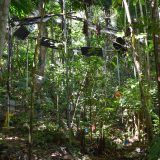March Research Highlights New alumni publications began as Grand Challenges Initiative projects
March 29, 2024
Recent publications by faculty, alumni, and undergraduate students in the Schmid College of Science and Technology demonstrate the breadth of research activity across the college.
Richelle Tanner, assistant professor of environmental science and policy, has been awarded a new grant from the Division of Biological Infrastructure at the National Science Foundation. The two-year award, which provides $494,000 in funding, will focus on reforming organizational culture among scientific societies that focus on biology by using education, reflection, and guided action planning to center their efforts on a more holistic approach to the communities they serve.
Daniel Mejia ’22 is the lead author on a new paper in the journal Scientific Reports on how the physical properties of odors affect the ability for search dogs to identify them. The study evaluates how effective trained detection dogs were in searching for scents associated with explosive materials. It is part of a larger research program funded by the Office of Naval Research and led by Assistant Professor of Biological Sciences Lindsay Waldrop to understand which breeds of dogs are best suited for scent detection. Additional Chapman co-authors include Postdoctoral Fellow Nicholas Hebdon and students Alexis Shiber ’23 and Clay Cranston ’23.
Former Grand Challenges Initiative Postdoctoral Fellow Carter Berry has been issued a patent for his invention with Associate Professor of Biology Gregory Goldsmith and former student Fernando Silva ’21. The invention, a 3D-printed device that manipulates the directionality of light, is used to test how the effects of clouds alter light and thereby change plant growth. Silva, who played a key role in drawing the initial design for the device, has since leveraged his love for invention into a successful business called Terra Labs Design. You might recognize his lamps, which lit up such celebrities as Taylor Swift at the 2024 Grammys.
Slade Laszewski ’22 is the lead author on a new paper in the journal Environmental Research Communications that provides new insights into population growth at the wildland-urban interface in the communities across California. The project, which started among a team of students as part of the Grand Challenges Initiative, shows particularly high growth of residents in the Bay Area and in southern California communities in Riverside county. Such populations are particularly at risk of the impacts of wildfires. Laszewski, now a graduate student in geographic information systems at Miami University of Ohio, was mentored by Shenyue Jia and Brian Hoover (now at Miami University and Farallon Institute, respectively).


